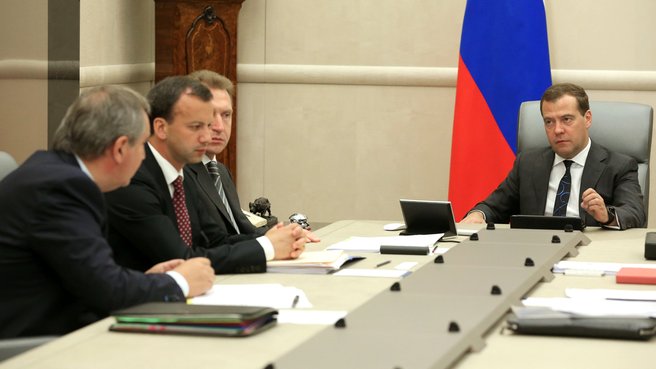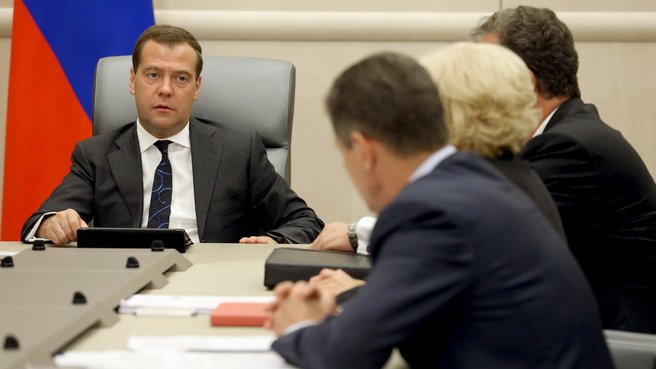Transcript of the beginning of the meeting:
Meeting with deputy prime ministers
Dmitry Medvedev: There will be a major meeting on budget issues soon. As usual, we sit down with Deputy Prime Ministers early in the week before this meeting.
I'll start with utilities which is an important issue for all Russian people. As you are aware, July is the deadline by which water, heat and electricity meters should be installed in residential buildings across Russia (if I remember correctly, we revised this deadline several times). The goal is, of course, to improve energy efficiency, make our homes less energy intensive and, of course, make utilities bills more transparent and fair, because there are a lot of complaints about this. The same kind of work has been performed in non-residential buildings for a year already, and despite strict regulations, it has not yet been completed. Mr Dvorkovich, will you briefly update us on how things stand with residential and non-residential buildings, and on your plans for the near future.
Arkady Dvorkovich: Requirements for installation of meters in blocks of flats were adopted in November 2009.
Dmitry Medvedev: I remember that.
Arkady Dvorkovich: The owners were given more than two and a half years to install them - until July 1, 2012. With some owners failing to install meters, management companies and homeowners' associations were given one more year to complete this work with the deadline set at July 1, 2013, accordingly. This deadline is next week. Meter installation by a management company or an HOA was to be paid for by owners during the past year.
According to expert estimates, water and heat meters were installed at about 50% of the households as of late 2012. Electricity meters were installed at about 60% of the flats, but we still have a long way to go before we get it 100% done. The law says that if a meter hasn’t been installed by July 1, then the utilities companies should go ahead and install meters, with the flat owner providing access to the flat and covering the installation costs. Management companies or HOAs will have to pay administrative fines for failure to meet with their obligations anywhere from 5,000 to 10,000 roubles for officials and 20,000 – 30,000 roubles for legal entities. No sanctions will be applied to residents at this point, and they will not have any financial implications until January 1, 2015. Nevertheless we hope that the adopted measures will encourage people to install meters and that this work will be essentially completed by the deadline, though probably not in full. I’d like to point out that people usually pay less than the full rate when they have meters. So there is a financial incentive but not everyone appreciates this fact. People don’t know how much less they will pay. They are afraid they’ll have to pay more…
Dmitry Medvedev: You must tell them! You must tell them about this in all regions.
Arkady Dvorkovich: Mr Kozak explained to people in the regions what incentives they will enjoy…This work has been done.
Dmitry Medvedev: What’s the main incentive? To pay less. This is what matters the most.
Arkady Dvorkovich: This is the incentive – to pay less. Moreover, the surcharge applied to customers without a meter will be increased every six months. Maybe Mr Kozak will speak in more detail about the explanatory work he did with regional governors and companies.
Dmitry Medvedev: Mr Kozak, please go ahead.
Dmitry Kozak: With this aim in mind, we adopted Government Resolution №344 on April 16. It contains incentives for people and managing companies that are encouraged to install meters for all types of utilities. Starting January 1, 2015 (this has already been announced – it’s a provision of the resolution), the surcharge coefficient will be increased to 1.1; to 1.2 on July 1, 2015; to 1.4 on January 1, 2016; and by 2017 it will reach 1.6.
This should encourage people to install meters and, as Mr Dvorkovich said, conditions have been created to make this less burdensome. Under the law on energy efficiency, utility suppliers are obliged to install meters at the request of citizens who can pay for this by instalments over five years. The interest should not exceed the Central Bank’s refinancing rate. It is necessary to explain the provisions of this resolution in the regions on a large scale. People should understand what to expect if they fail to install meters.
On June 1, the Government issued an instruction to all regional governors to bring utility norms in line with actual consumption patterns in different categories of buildings. People should see how much they consume now, what they can consume and how much less they can consume and pay using the meters. We must streamline utility norms. On the Government’s instructions, experts analysed the norms established by the regions (Mr Medvedev, this was done in 2010 on your instructions). The situation is very different from one region to another, although a centralised decision was taken on this score. There are instances where utilities consumption norms are below actual consumption. In such cases, customers are not interested in using meters. However, in most cases, the norms are higher than the actual consumption, many times over in some regions. However, they may be different in the same block of flats, in the same climate conditions, and they also vary across regions. So we issued a directive as a follow-up to Resolution No. 344 to bring these norms in line with actual consumption. Thus, utility providers and consumers will have a genuine incentive (based on these factors) to install meters in order to pay only for their actual consumption rather than according to the established consumption norms.
Dmitry Medvedev: Anyway, this work must be completed, because, first, it’s really good for consumers; second, because the whole world operates like that; and third, the situation where some households are equipped with meters and others are not makes no sense whatsoever. It distorts the reporting and records system. So keep working, and if you need any additional decisions regarding incentives or technical issues, just let me know, and we’ll adopt them.
There’s one more issue that I want like to touch upon in the open part of our meeting - the state defence order. In April, Mr Rogozin updated us on the government contracting status with all its problems and setbacks. However, the volumes have increased, and the trend is upward. It is also clear that all contracts should be signed much faster than they are today.
Ten days ago, I approved lists of items under the defence order that are subject to government price regulations. They include individual groups of items that are formed with due account taken of the interests of all parties involved in the implementation of the state defence order. It includes, of course, advanced weapons and equipment and components with a long production cycle. In any case, although this is not a market measure, I hope that this practice will help with the pricing. You deal with other defence issues that are related to placing and executing the state defence order. What has been done? Please go ahead Mr Rogozin.
Dmitry Rogozin: Mr Medvedev, this is, in fact, the first legal act of the Government that is based on the new law On the State Defence Order, adopted in late 2012. On this list we have only eight draft Government resolutions. You signed the first and most important one. We will put together and submit two more to the Government before the end of June. One of them is a long-awaited draft legal act on the procedure governing price regulation by the state for products supplied under the state defence order, and, accordingly, on the powers of federal executive authorities and the Rosatom State Corporation with respect to the state defence order. I hope that they will be adopted in early July at a Government meeting.
Next, the resolution on the terms and conditions and the procedure governing the pricing for items manufactured under the state defence order and, of course, the suggested terms and conditions of government contracts related to the state defence order, which is the most important of these eight resolutions and directives. We will introduce three price types. This will be a tentative price, which will be mostly used for repairs of sophisticated military products. This is because when a warship arrives at a shipyard, fault detection is required to identify real problems with the ship, so the price will be specified in the process of repairs. Prices will remain fixed for the products where we can calculate the exact price. Of course, prices will also be determined by the fact that we will be building sophisticated equipment and special military equipment that will be created under the current and future weapons programmes that we will adopt in 2016. That includes new submarines and new missile defence systems.
Indeed, it’s hard to set prices, so finally we will operate using three kinds of prices, which will allow executive authorities to agree on how to negotiate prices that would spur the technological upgrading of enterprises and the depreciation of fixed assets.
We plan to complete this work by October, so that beginning January 1, 2014, we can have the regulatory framework in place and proceed with the fulfilment of the state defence order in a new legal environment.
There are more contracts this year and the execution of these contracts is a little better than in 2012. People are getting used to their new responsibilities and they have better work relations, but the new legal framework will create a completely different and clearer environment that will increase the responsibility of state defence order customers, who should provide timely and clear technical requirements, and the enterprises.
Dmitry Medvedev: It will be a good thing if such a system works well. I'll be happy. However, since we are directly intervening in these matters, I want you to keep an eye on developments, because problems are as likely here as successes. If we feel that something isn’t working, we will need to adjust, since we’ve assumed responsibility, albeit partial, for price formation in the area of defence contracting. Let's see how it’ll work out for us. The goal is clear - to cut costs, reduce existing requirements and make products more competitive. But we should respect the laws of the market, as well. Thank you.
<…>













